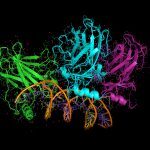Link to Pubmed [PMID] – 28287737
J. Proteome Res. 2017 04;16(4):1617-1631
Urothelial bladder cancer is a condition associated with high recurrence and substantial morbidity and mortality. Noninvasive urinary tests that would detect bladder cancer and tumor recurrence are required to significantly improve patient care. Over the past decade, numerous bladder cancer candidate biomarkers have been identified in the context of extensive proteomics or transcriptomics studies. To translate these findings in clinically useful biomarkers, the systematic evaluation of these candidates remains the bottleneck. Such evaluation involves large-scale quantitative LC-SRM (liquid chromatography-selected reaction monitoring) measurements, targeting hundreds of signature peptides by monitoring thousands of transitions in a single analysis. The design of highly multiplexed SRM analyses is driven by several factors: throughput, robustness, selectivity and sensitivity. Because of the complexity of the samples to be analyzed, some measurements (transitions) can be interfered by coeluting isobaric species resulting in biased or inconsistent estimated peptide/protein levels. Thus the assessment of the quality of SRM data is critical to allow flagging these inconsistent data. We describe an efficient and robust method to process large SRM data sets, including the processing of the raw data, the detection of low-quality measurements, the normalization of the signals for each protein, and the estimation of protein levels. Using this methodology, a variety of proteins previously associated with bladder cancer have been assessed through the analysis of urine samples from a large cohort of cancer patients and corresponding controls in an effort to establish a priority list of most promising candidates to guide subsequent clinical validation studies.


